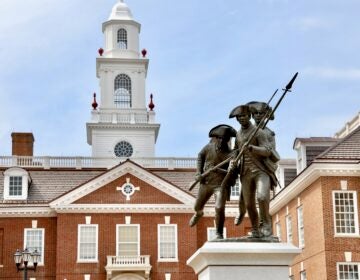Pennsylvania has right-to-know law, but austerity hinders transparency
Until six years ago, state government in Pennsylvania languished in its lack of any measure of transparency. Legislative leaders in the General Assembly had no interest in a law that opened records to the public while access to what records were available was a cumbersome process.
Moreover, the legislative process was becoming ever more restricted to scrutiny as most of the work was done among a handful of leaders and senior staff. The rank and file voted on bills they had little time to read. Controversial appropriations usually only came to light after the governor signed the budget into law, not before.
All of this was incongruous with the history of Pennsylvania, the birthplace of the nation and its principles of governance, where the Founding Fathers drafted, debated and adopted the Bill of Rights and the United States Constitution, at great peril to their lives.
Yet, despite its awesome historical significance, Pennsylvania’s state government receives just average scores from the State Integrity investigation – a joint project by the Center for Public Integrity, Global Integrity and Public Radio International. Pennsylvania earns a C- rating, a number grade of 71, and a ranking of 19th among the 50 states. While it has recently made efforts aimed at greater transparency and openness in some areas, it has remained stubbornly resistant to being more transparent and responsive in others, particularly in the judiciary.
A storied history
Pennsylvania, with a population of 12.7 million, has a powerful economy, the sixth largest in the country. The state’s unemployment rate, currently at 7.6 percent has stayed well below the national rate, Still, the states has felt the severity of economic headwinds from the recession that began in 2008. Local governments have struggled financially, and some have increased taxes significantly to pay for budget shortfalls. Harrisburg, the state’s capital, teeters on the brink of financial collapse because of mountains of debt created by incompetent decisions and bad policies. Gov. Tom Corbett has gutted some programs, cut staff and imposed a pay freeze on state workers to balance the state’s $63.4 billion budget. Corbett has refused to raise taxes and the austerity measures he and the legislature have pursued have reduced the effectiveness of those offices charged with ensuring openness and accountability.
Pennsylvania earned the nickname Keystone State not only for its central location when it was one of the 13 colonies, but also for its vast natural resources – coal, oil, gas and agriculture – that helped forge the nation’s economy, along with manufacturing might that today ranges from breweries and chocolate to paper plants and steel mills. Moving it all is an extensive transportation system, navigable by great rivers such as the Delaware and Allegheny, railroads that crisscross the state, and the more than 121,000 miles of highways that run the length of Pennsylvania in every direction.
But the state’s government has not measured up, particularly in recent years, to the strengths of its history, resources and economy. This is largely because of a system that had come to cater to itself first before serving the public.
That all began to change in summer 2005, when the General Assembly approved a late night budget that included a significant pay raise for the lawmakers themselves. A usually apathetic public went ballistic. Citizens became further incensed when many learned for the first time of the annual, automatic cost-of-living increase lawmakers had been receiving in addition to their generous healthcare and pension plans.
Angering the voters even further: hefty pay raises for a judiciary that already earned six-figure salaries, along with generous health and pension plans.
A blood-letting at the polls the following year left two, longtime senior senators – the president pro tempore and the majority leader – out of their jobs. A Supreme Court justice had lost a retention vote, the first time a justice had been turned out since judicial elections began in 1969. Another justice won by such a narrow margin that she retired. More than 20 incumbents in the General Assembly lost their seats.
The election was seen by some grass-root reformers as a long overdue house cleaning that brought in fresh ideas from new faces. There were some minor changes made to the legislative process. The pay raise was rescinded.
However, the following year, 2007, an enormous scandal broke when a memo from a House leader was leaked detailing how lawmakers used state tax dollars to reward staff and themselves for working political campaigns. Then-Attorney General Tom Corbett began to investigate so-called bonus payments, approximately $3.8 million, and in the process uncovered a culture of corrupt and unethical practices that appeared to indict the legislature in general, though there were many exceptions.
What followed were seemingly endless grand juries, indictments and convictions of key legislative leaders such as House Minority Whip Mike Veon (D), convicted in two corruption trials and sentenced to prison, and, more recently, former House Speaker John Perzel (R), who pled guilty for, among other things, spending $1.8 million of tax dollars on data collection software to serve election campaigns. Many senior aides and staff who worked directly with these lawmakers also were convicted.
Last fall, in another trial in the scandal, a key aide to Perzel, Brett Feese, who was also a former senior lawmaker, was found guilty of corruption. In February 2012, former House leader H. William DeWeese was convicted of theft, conspiracy, and other charges. Other lawmakers await trial.
High-profile probes
Up until the scandal, there was concern about corruption, but not at the state level and not in the legislature. In early 2006, less than a year before news of “Bonusgate” broke, Attorney General Tom Corbett formed a public corruption unit, largely out of concern over the introduction and growth of legalized gambling in Pennsylvania
“By creating a Public Corruption Unit, the Attorney General’s Office is putting a spotlight on investigating and prosecuting public corruption cases at a crucial time in our state’s history when slot machines and casino gaming is about to become reality,” he said, at a February 2006 press conference.
Yet, the corruption cases he would pursue had nothing to do with gambling.
Corbett, much to the chagrin of many in both political parties, made his office’s “Bonusgate” investigations high profile. He conducted press conferences that were reminiscent of the 1950s and 60s U.S. Senate hearings into the mob, and ensured the press was informed whenever a lawmaker or staffer appeared in court to be charged, providing “perp walk” photo ops.
Corbett, a Republican, had his detractors, particularly among Democrats whose colleagues and friends were the first to get indicted in the scandal. Many Republicans also were resentful. Some privately warned there would be retribution against him if he began prosecuting members of the Senate GOP. Corbett’s investigations and prosecutions ended in the House, although they technically had included the Senate. He ran for and won the governorship in 2010. The tally was sobering. Between 1998 and 2007, 11 legislators including a senior Senate leader had been convicted of crimes ranging from killing a man in a hit-and-run accident to tax fraud to hiring an underage prostitute.
A change in culture
The pay raise and bonus scandals, however, rocked the political and legislative culture in Harrisburg. Both chambers introduced their own code of ethics and now require freshman lawmakers to receive ethics training. There is a heightened sensitivity to crossing the line from state- or legislative-related business over to politics, though even under the best of circumstances that line blurs because of the nature of democracy.
The most significant change – at least in how it relates to Pennsylvania’s political establishment and its long intolerance toward openness – is that the General Assembly finally passed and the governor adopted in 2008 a significant new open records law that places the burden not on the public seeking records but on the government. Every time a record is denied the agency has to justify its actions.
“The right-to-know law fundamentally changed the way people access public records of their government,” said Terry Mutchler, a former journalist and now executive director of the state’s Office of Open Records. “If the government agency chooses to withhold a record, the agency has the burden to prove – with legal citation – why that record should not be available to the public.”
Pennsylvania, Mutchler said, “has one of the strongest [open records] law in the nation right now. It’s a one-two punch.”
While this clearly is a reversal from the state’s old policy, it nonetheless has its challenges. First, every agency has a legal staff that often chooses to deny a request for a record, which requires OOP to review and inform the agency that the record is open. The agency, to date, has determined that most records that have been denied since the law went into effect in January 2009 are indeed open, Mutchler said.
“Many times I find that public officials in Pennsylvania want to do the right thing, it’s their lawyer who says, ‘no,'” Mutchler said.
Still, her office has no enforcement powers. That’s the courts’ purview, which means if an agency ignores OOP’s order to release the record the citizen has to spend time and some money to pursue his or her request through the legal system.
“We certainly have access to more records than we used to,” said Barry Kauffman, executive director of Common Cause/Pennsylvania.
However, said Kauffman, “Some of the court decisions and some of the decisions by the Open Records Office have diminished what we thought was in the law.” Of 309 appeals filed against state and local agencies for denied requests, only 15 percent were fully or partly granted, according to a 2010 report of the Office of Open Records.
Pennsylvania’s government has made some strides toward openness and more accountability, but advocates like Kauffman say it could go much further.
One example is the Public Corruption Unit the attorney general created in 2006. Anyone looking to report corruption, won’t find a link to the unit on the AG’s website. The AG’s office, directed a reporter to the Criminal Law Page, but the unit isn’t listed there, either.
Indeed, it’s often difficult to find specific information regarding any number of issues or concerns on most of the state government’s websites. The information is there, you just have to know where to find it, and to know where to find it you have to be well versed in the topic or issue you are pursuing. Access appears to be based on a presumption of in-depth knowledge.
As well, a culture of intolerance to openness, or at the very least a lack of interest in the idea, prevails. A case in point is the State Employees’ Retirement System, for the most part a transparent institution. Its website is fairly comprehensive, but it did not include the board’s ethical code of conduct until an inquiry was made about it. The next day the code was posted as a pdf icon not on the homepage, but on the lower right hand corner of the page listing the board members.
Moreover, the code begins with a statement from the board that drips with impatience: “The State Employees’ Retirement Board (the “Board”) is aware of its fiduciary obligations and the need to conduct itself in accordance with high ethical standards. Although the members of the Board feel that they have conducted themselves in a manner satisfying such obligations and complying with such standards, the Board has concluded that it will be beneficial to establish a clear ethical conduct policy … .”
Websites run by the Office of Open Records and the State Ethics Commission are accessible even to the novice who seeks records or to file a complaint. The Ethics Commission provides step-by-step instructions. Nonetheless, routine under-funding of the agency makes it difficult for the commission to effectively conduct its mission, Kauffman said. The same is said for agencies such as the Department of State, which recently took months to post a backlog of campaign finance reports.
Some strides have been made in other areas. The state adopted a lobbyist disclosure law with a broad scope on monitoring and regulating who is trying to influence the legislative and executive branches. In other areas the state remains stubborn. Pennsylvania has never had limits on campaign contributions, but that now appears moot after the U.S. Supreme Court unbridled spending limits for corporations and unions.
While scandals in the legislature have brought about some change, a scandal in the judiciary has done little to effect change in a branch of government that has completely isolated itself from any check or balance. In 2000, the state Supreme Court ruled that it has exclusive jurisdiction over the conduct of its judges and staff.
A court of judicial discipline and oversight agencies in the judiciary are aimed at investigating complaints. These agencies failed to address complaints about two judges in Luzerne County who were eventually convicted for taking kickbacks from the co-owner and builder of two private, for-profit juvenile facilities. In return, the judges contracted with the facilities and ensured the facilities had populations to oversee by imposing unduly harsh sentences on juveniles brought before their courts.
Only after the fact did the state Supreme Court investigate the matter followed by an investigation by the General Assembly.
“The judiciary has been in my view the most difficult government entity to deal with,” said John Baer, a longtime columnist for the Philadelphia Daily News. “They have an attitude of supremacy that is counter-productive to transparency.”
The scandals only opened the doors of state government a little more, but they have made more people aware of their government, which is essential to maintaining transparency. But many remain disappointed that Pennsylvania, the cradle of American democracy, doesn’t do better. .
“We should be the national leader,” Baer said. “We should be the most transparent, the most open; the most democratic – that we’re not is just a shame.”
WHYY is your source for fact-based, in-depth journalism and information. As a nonprofit organization, we rely on financial support from readers like you. Please give today.




